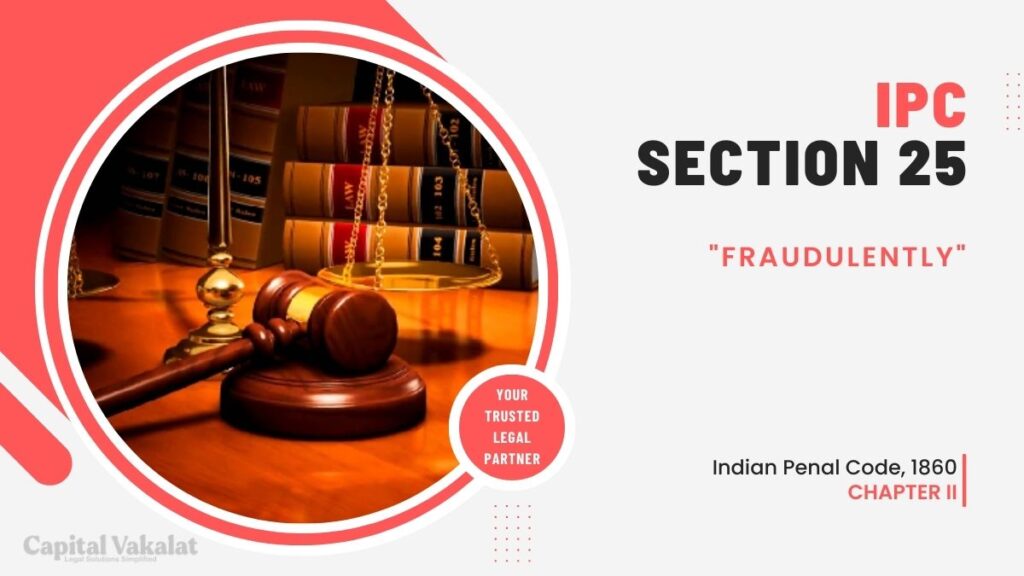Fraud has long been a concern in legal contexts, causing harm to individuals, businesses, and societies at large. In the realm of criminal law, Section 25 of the Indian Penal Code (IPC) addresses the offense of “fraudulently.” This article delves into the intricacies of Section 25 IPC, exploring its definitions, elements, punishments, and implications.

In a world driven by economic transactions and trust, fraud stands as a formidable threat. Section 25 of the IPC focuses on fraudulent activities, which encompass a wide range of deceitful actions intended to gain an unfair advantage or cause financial loss to others.
Understanding Fraud under Section 25 IPC
Section 25 IPC defines “fraudulently” as the intentional use of deception, dishonesty, or misrepresentation to attain property, services, money, or an advantage. This provision seeks to deter individuals from engaging in acts that undermine the foundation of trust in both personal and business interactions.
Essential Elements of Section 25 IPC
For an act to be considered “fraudulently,” certain essential elements must be present:
1. Deceptive Intent
The accused must possess a deliberate intention to deceive, whether through false statements, concealment of facts, or distortion of information.
2. Misrepresentation
Fraud typically involves presenting false information, which leads the victim to make decisions they wouldn’t have otherwise.
3. Gain or Loss
The act of fraud must result in either wrongful gain to the accused or financial loss to the victim.
4. Dishonesty
A key element is the use of dishonest means to achieve an advantage or cause harm.
Punishment for Committing Fraudulently
Perpetrating fraudulently under Section 25 IPC is a serious offense. Conviction can lead to imprisonment, fine, or both, depending on the severity of the act and the resulting consequences.
Cases and Precedents
Over the years, courts have dealt with numerous cases involving fraudulently under Section 25 IPC. Landmark judgments have helped shape the interpretation and application of this provision.
Navigating the Legal Process
When a person is accused of committing fraudulently, the legal process involves investigation, trial, and the presentation of evidence. A fair trial is paramount to ensure justice is served.
Safeguards and Defenses
The legal system provides safeguards for the accused, such as the presumption of innocence until proven guilty. Defenses like lack of intent or mistaken identity can play a crucial role in court proceedings.
Impact on Society and Economy
Fraudulent activities can have far-reaching consequences on society and the economy, eroding trust, destabilizing businesses, and hampering growth.
Differences from Related Offenses
Section 25 IPC distinguishes itself from other offenses by specifically targeting acts conducted with fraudulent intent, setting it apart from crimes driven by force or coercion.
Role of Intent and Knowledge
To establish guilt under Section 25 IPC, the prosecution must prove both intent and knowledge of the fraudulent act on the part of the accused.
Prevention and Awareness
Creating awareness about fraudulent activities and their repercussions is vital for preventing such acts. Educating individuals about their rights and responsibilities can contribute to a more vigilant society.
Challenges in Prosecution
Prosecuting fraud cases can be challenging due to the need to establish intent, gather evidence, and navigate complex financial transactions.
The Need for Stringent Enforcement
To uphold the rule of law and protect the interests of individuals and businesses, it’s imperative for authorities to enforce Section 25 IPC rigorously.
Future Reforms and Adaptations
As new forms of fraud emerge in the digital age, legal frameworks like Section 25 IPC may need to evolve to address novel challenges effectively.
Conclusion
Section 25 IPC serves as a critical deterrent against fraudulent activities, safeguarding trust and integrity in various spheres of life. By understanding the nuances of this provision, society can work towards a more just and transparent environment.
Certainly! Here are some external resources that provide further details on the topic of “Section 25 IPC: Fraudulently”:
- Indian Penal Code, 1860 – Section 25: Explore the official legal text of Section 25 IPC, detailing its provisions and definitions.
- Landmark Cases on Fraudulent Activities: Learn about significant court cases that have shaped the interpretation and application of fraud-related sections in the Indian Penal Code.
- Legal Awareness and Prevention of Fraud: Gain insights into preventing fraudulent activities and increasing legal awareness to protect yourself and your business.
- Understanding Fraud and Its Types: A comprehensive guide that explains different types of fraud, including those covered under Section 25 IPC.
These resources will provide you with a deeper understanding of the topic and its legal implications. Remember to verify the accuracy and credibility of the information from these sources.
FAQs
What are the key elements of fraudulently under Section 25 IPC?
Deceptive intent, misrepresentation, gain or loss, and dishonesty are key elements.
What are the potential consequences of committing fraudulently?
Conviction can lead to imprisonment, a fine, or both, depending on the severity of the offense.
How can society prevent fraudulent activities?
Raising awareness, educating individuals, and enforcing the law can help prevent fraudulent acts.
Why is intent crucial in proving guilt under Section 25 IPC?
Intent establishes the accused’s deliberate plan to deceive, forming a vital aspect of the offense.